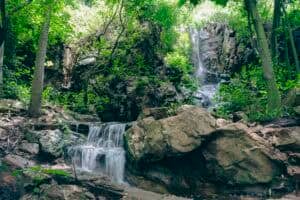Although not a new practice, with a number of cultures using bark for medicinal purposes, rangers are noticing glaring forest gaps that could cause an ecological disaster.

Despite being one of South Africa’s smaller national parks, the Table Mountain National Park (TMNP) has no shortage of problems facing the area’s flora, fauna and marine life.
TMNP rangers have begun to notice alarming rates of a trend known as bark stripping, in which large portions or whole trees are stripped bare using sharp objects such as pangas or spades.
Bark is then dried and crushed to chew or consume.

A tree stripped of its bark. Photo: Nica Richards
In addition, the park’s fynbos species is also being unsustainably harvested for medicinal purposes.
The Cape Peninsula has more than 2,200 plant species – more plants than in the entire UK.
Although not a new practice in South Africa, with a number of cultures using bark for medicinal purposes, rangers are noticing glaring forest gaps that could cause an ecological disaster.
Sustainable harvesting of most plants and animals does not pose a problem for ecosystems, but the large scale in which these purported medicinal products is alarming, said senior TMNP ranger Jaclyn Smith.
What trees are being targeted?
Smith said the region’s indigenous trees are being used for bark stripping.
This includes Cape Beech, Assegai/Cape Lancewood, Cape Holly and Stinkwood trees. In the Newlands Forest, Cape Beech’s are particularly vulnerable.

A Cape Beech tree being stripped of bark. Photo: Nica Richards
Smith said it was not yet known exactly what the long-term ecological impacts could be.
“I think it’s still too early to know the future impact. I think for many forest dynamics, it takes years for trees to get to this stage. Once you get forest gaps, more sunlight filters in, and it changes the nature of the soil, the moisture of the soil, the species diversity, there’s a whole lot that is influenced,” Smith explained.
Once a ranger finds a stripped tree, the affected tree is logged in a GPS system. The scar, or gap left due to stripping the tree, is then measured and treated with tree paste made of cow manure.

A SANParks ranger on her way to treat a stripped tree with tree paste and a brush. Photo: Nica Richards
Trees are sealed in an attempt to save the tree, explained Newlines Forest section ranger Chamell Pluim.
Pluim compared bark stripping to removing a person’s first layer of skin: one then becomes susceptible to a host of infections.
Trees are no different. Once they are stripped of bark, trees become vulnerable to insect invasion and decay, and could eventually die.
“It’s quite devastating for many of the rangers. For us, this is a rhino. For us, this is an abalone; for us, any tree species where this is happening, it’s quite sad,” Pluim said.
There have been some successes with tree paste painting, with shoots growing out of stripped trees, but another problem is the trees that are targeted are often not yet fully grown.

Photo: Nica Richards
“We have to start planting now to get the forest back to its original state.”
What is tree bark used for?
The array of cultural diversity along the Cape Peninsula has seen many full-time practising traditional healers and a steady influx of medicinal plant consumers.
28% of the 2,285 plant species in the City of Cape Town are listed as vulnerable to endangered on the International Union for Conservation of Nature (IUCN) red list.
Cape Beech (Rapanea melaphloes, Afrikaans: Boekenhout)
Currently the most harvested tree for bark stripping
- Used as an expectorant, or medication that helps rid the body of mucus from the upper and lower airways;
- Also used as an emetic, or a substance that causes vomiting;
- Used for muscular pain;
- Used to treat stomach disorders; and
- And is believed to strengthen the heart.
Assegaai (Curtisia dentata, English: Cape Lancewood)
- Used to treat stomach ailments.
Cape Holly (Ilex mitis, Afrikaans: Waterboom)
- Bark acts as a purgative or laxative;
- Used to cure constipation;
- Used as an enema to treat colic in children.
Stinkwood (Ocotea bullata, Afrikaans: Stinkhout)
- Used to treat headaches;
- Used for urinary disorders;
- Used to treat nervous disorders; and
- Used to treat diarrhoea.
How bark stripping is being dealt with
Aside from trying to resuscitate stripped trees, rangers are also trying to reinvigorate law enforcement responses to the trend of bark stripping.

A tree being treated by a paste made of cow manure. Photo: Nica Richards
Three suspects were recently arrested by Smith and Pluim with 59kg of bark packed into four bags in the Rose Memorial area.
Upon searching the suspects, they found a long panga.
Although not aggressive, Smith said there is evidence of an influx of people coming into Newlands Forest at night, sleeping in the forest, stripping trees and leaving before rangers can get to them.

Photo: Nica Richards
Nearby, charred logs of wood and cigarette butts litter a makeshift campsite belonging to those now fuelling the unsustainable harvesting of tree bark.
What makes matters difficult is that the demand is not yet known, and that the street value of medicinal plants changes according to the demand.
Those caught are liable for a fine, but Smith said rangers are following the case very closely.
“It’s a huge deal, 59kgs is a lot of trees.”

Photo: Nica Richards
The street value of the busted bark is still being investigated, Smith added.
She said rangers often feel despondent by the growing list of wildlife crimes, and are sometimes let down by the judicial system, but is hopeful that the arrest will set a precedent for future bark stripping transgressions.
For more news your way, download The Citizen’s app for iOS and Android.






